- Forum
- categories
- Attitudes and behaviours
- Wikipedia
- Our Sanitation Wikipedia survey - results and discussion
Our Sanitation Wikipedia survey - results and discussion
29.6k views
- Elisabeth
-
Topic Author
- User is blocked
- Freelance consultant since 2012
Less- Posts: 3372
- Karma: 54
- Likes received: 932
Re: Please take our short Sanitation Wikipedia survey - last opportunity until end of the week
Please log in or register to see it.
I copy here the summary from my report:
+++++++++++
Summary
A short survey was set up with 10 questions and advertised for a period of six weeks. We received 310 responses which were likely predominantly by SuSanA members. The main purpose was to check if SuSanA members had noticed an improvement in WASH related content in the English Wikipedia during the last two weeks. Therefore, Question 6 was the most important question which was: “Have you noticed a change in Wikipedia's sanitation, water and hygiene content in the last year or two? (for the English Wikipedia)?”. About one third of the respondents felt that the sanitation content on Wikipedia has improved lately (by agreeing or even strongly agreeing to this statement). We see this as a positive result, given how difficult it is to notice subtle changes in the quality of a Wikipedia article over a two-year period.
57% of respondents said they use Wikipedia weekly or even daily. Respondents use Wikipedia for work and non-work purposes (the most common topic area was countries, regions or towns). The usage of Wikipedia has neither increased or decreased recently for most people (Question 4 results).
The two main reasons selected for rarely or never using Wikipedia were: "The information that I look for is usually not available on Wikipedia" and that they “don't trust Wikipedia” (Question 3 results). The issue of trust came up often also in the answers to some of the other questions (e.g. Question 9 and 10 results). Both of these reasons are something we could tackle in future by adding information on more topics and by adding more reliable sources.
The answers to Question 5 helped to identify the most pressing problem areas with Wikipedia articles. They are: not enough references provided as sources for information and not well illustrated with photos, schematics etc. This matches with Question 9 results.
The answers to Question 7 revealed that 58% of people do use Wikipedia also in other languages. The main reasons why people use Wikipedia in other languages are (a) for using it as a translation aid or (b) to access content that is more specific to the country whose language they speak or understand.
We have currently no plans to work on the non-English language Wikipedias. However, if we have collaborators who speak another language (or if Google Translate works well in that language) and if content is more detailed in another language, one possibility could be to translate that content into English.
When asked if they would donate money to Wikipedia in the future about half of the respondents were undecided; about one third said "no" and only about 16% said yes (Question 8 results). It is not our job to help Wikipedia raise funds but these results could give some indication for the applicability of crowd-funding approaches for SuSanA.
The improvements that people would like to see in Wikipedia articles were mostly about more photos and videos, as well as more references and trustworthy sources (Question 9 results, which also match up with Question 5 results). Some people also pointed out that they would like to see more up to date information, more information related to developing countries or the African context in particular and more best practise examples. It should be noted that “best practice” examples may go against the grain of an encyclopedia which is not meant to judge but just to describe objectively. However, if we find publications that talk about best practice examples then it would be fine to quote those in the Wikipedia articles.
The central importance of Google came out in the answers to Question 3, 9 and 10. The majority of people let Google help them find what they are looking for, rather than going to websites directly. So it is important for any website to have a good Google ranking. Wikipedia articles tend to rank very high on Google searches. So even if people don't go to Wikipedia directly, they often end up there via Google (unless they have a bias against Wikipedia and skip over that search result, or unless they are not interested in an overview but want to go straight into the details).
The survey also reinforced that we need to help people realise that Wikipedia is not a source in itself. It just aggregates the information from reliable publications and websites and makes it accessible and findable - hopefully in an objective and unbiased way. It has a great potential to provide an overview for any member of the general public. It gives people a convenient access point to dig deeper by using the sources provided in the Wikipedia articles.
++++++++++++
Regards,
Elisabeth
Freelance consultant on environmental and climate projects
This message has an attachment file.
Please log in or register to see it.
Please Log in to join the conversation.
You need to login to reply- Elisabeth
-
Topic Author
- User is blocked
- Freelance consultant since 2012
Less- Posts: 3372
- Karma: 54
- Likes received: 932
Re: Please take our short Sanitation Wikipedia survey - last opportunity until end of the week
Carol:
Yes, the Wikipedia article on hygiene (en.wikipedia.org/wiki/Hygiene) needs more work for sure. The points that you have described might fit better into the related articles on handwashing (en.wikipedia.org/wiki/Hand_washing) or on food hygiene (en.wikipedia.org/wiki/Food_safety). Keeping in mind though that Wikipedia is not a "how to guide" but an encyclopedia, so we wouldn't be adding "general health advice".
As an aside I think food hygiene is super important if you live in an environment with pathogens everywhere, like in an urban slum, but less important if you are lucky to live in a clean, healthy community, like most households in the US or Australia, I would assume. E.g. I never wash onions before peeling them, or wash avocados before cutting them - had never even heard of that advice, and I don't think it has a negative effect on my health here where I live. I didn't get this point: "The nurse pointed out that keeping the lower extremities clean required washing the anal area first."? Why does it make a difference which body part you wash first?
If we are adding any information on health impacts in relationship to food hygiene to the Wikipedia article we always have to have reliable sources for it, like meta-reviews, publications in the Lancet and so forth. Sometimes this can be time consuming to find them, or the evidence doesn't exist (yet).
I agree with you that "we need to help people evaluate the strength and reliability of online information, studies, and reports."
This is probably something that needs to happen at school and at universities. It is scary how scientific evidence is nowadays swept aside by the highest politicians ("who needs experts anyway, I rather trust some dodgy website or blog that I have found" - see the whole climate change and vaccination debates in the U.S. and elsewhere). I see a huge role that Wikipedia could play in the fight against the spread of fake news. I just need to find a philantropic organisation who is willing to pay for my editing time in future.
Wikipedia has a page that explains to people how to spot a reliable source in general:
en.wikipedia.org/wiki/Wikipedia:Identifying_reliable_sources
And reliable sources in Medicine in particular:
en.wikipedia.org/wiki/Wikipedia:Identify...e_sources_(medicine)
Both pages are more geared towards Wikipedia editors but make for very interesting reading. I think too many people still think Wikipedia is just a place where "anyone can write anything" (not true). Even my children are taught at school by their teachers "Don't use Wikipedia! At all." rather than being taught "if you read an article on Wikipedia this is what you have to look out for to verify whether the information provided is from a reliable source or not".
Diane: About the issue of being representative or not: I guess the same problem exists with any survey that only the "keen" people bother to fill in a survey. There is no way to overcome that unless you make it compulsory for thousands of SuSanA members.
I think this survey had a low barrier for participation because it was short and almost everyone knows about Wikipedia.
If we wanted to know if the survey results were representative of the SuSanA members at large then we would have had to ask more questions about demographics, therefore making the survey longer and less attractive. Is there anything in particular that would worry you about it being not representative? When I wrote up the survey results I wrote "the survey respondents said that..." rather than "the SuSanA members said that" which should be the correct way of interpreting the results.
Regards,
Elisabeth
Freelance consultant on environmental and climate projects
Please Log in to join the conversation.
You need to login to replyRe: Please take our short Sanitation Wikipedia survey - last opportunity until end of the week
Elisabeth, I found the survey results fascinating. One has to wonder how representative the results are, since only highly motivated respondents would take the time to answer the questionnaire. No matter: I think it's quite important to make sure the best research is cited in Wikipedia articles, and I hope Sanitation Wikipedia has inspired more researchers to check out articles on their topics.
Diane
Partner, Kellogg Consultants
Hope for Africa: Director Sanitation Projects
Project 16,000: Reusable Menstrual Products (pads and cups) for Ghana
Please Log in to join the conversation.
You need to login to replyRe: Please take our short Sanitation Wikipedia survey - last opportunity until end of the week
I agree with Dr. Samanta that a sharper focus on hygiene is important:
While I have not dug into the Wikipedia articles on the various topics, I notice that the article for "Hygiene" is extremely long and sometimes rambles. At the same time, the article "Vector (epidemiology) is very brief and does not cover the transmission fecal pathogens nor link to the article "Fecal-oral route."
There appears to be no article in Wikipedia on the Hepatitis A outbreak among the homeless population of SanDiego, California in 2017. The infection and deaths of at least 15 unhoused individuals has been attributed to the lack of toilet and hand washing facilities and the well-documented reluctance of County and City authorities to provide them.
My own informal surveys show an astonishing lack of awareness of food hygiene in American homes. I complemented an actor in a play at out local theatre for washing an onion on stage before peeling it. She explained that the rest of the cast found this hilarious but that she was raised in a home where this was part of the food prep routine. This is not the norm. In fact, I routinely observe people cut, peel and prepare unwashed melons, avocados which have come directly from the market. Do realize how many unknown hands are likely to have squeezed that melon or avocado to check for ripeness? It's possible that my own practice of food hygiene came more from working in the global south than from my own education, and my mother was a home economics teacher!
Then there's personal hygiene. I recently was treated at a wound clinic for two infections, one on each leg, of mysterious origin. After a short course of antibiotics, they were simply cleaned and dressed by staff and I was taught to do this myself. I also changed my showering routine and purchased a pile of extra facecloths. The nurse pointed out that keeping the lower extremities clean required washing the anal area first.
Finally, I get Google alerts for the term "septic" because I'm tracking the vulnerability of US sanitation infrastructure, including septic systems. Over the past year, this keyword has yielded a marked increase in news of fatalities from septic shock, often attributed to the the overuse and growing ineffectiveness of common antibiotics. The first defense against illness is hygiene, and especially hygiene in and close to home.
On the matter of "the issue of reliability and reputation of Wikipedia" I like the responses quoted for survey question 9. I fully agree with Elisabeth's statement.
I think we need to help people realise that Wikipedia is not a source in itself. It just aggregates the information from reliable publications and websites and makes it accessible and findable - hopefully in an objective and unbiased way. It has a great potential to provide an overview and access point to dig deeper by using the sources provided.
How exactly can we help people evaluate the strength and reliability of online information, studies, and reports? Can we tag articles monitored by the Wikipedia Sanitation Project and explain the validation process used? What online tools or guidelines can we recommend to SuSanA members to help them authenticate the quality of what they are reading and may wish to act on? (This is especially important in face of the current scrounge of "fake news" and "alternative facts.")
Public Hygiene Lets Us Stay Human (PHLUSH)
1240 W. Sims Way #59, Port Townsend, Washington 98368 USA
Toilet availability is a human right and well-designed sanitation systems restore health to our cities, our waters and our soils.
Please Log in to join the conversation.
You need to login to reply- Elisabeth
-
Topic Author
- User is blocked
- Freelance consultant since 2012
Less- Posts: 3372
- Karma: 54
- Likes received: 932
Re: Please take our short Sanitation Wikipedia survey - last opportunity until end of the week
Question 9: What kind of improvements would you like to see done on sanitation-related content in Wikipedia?
This question attracted 198 responses. I have summarised the varied comments as follows:
People said they would like to see:
- More photos, videos, infographics, colourful maps
- More references, standardised reference list, trustworthy sources, more credibility and references, "if the sourcing was robust it would be a good source", "I would appreciate objectivity first, rather like Metcalf and Eddy"
- More up to date, current improvements and advances
- Building confidence about its quality
- Regional solutions for sanitation, more info related to African context
- More best practice
- More information about developing countries. Quote: "Wikipedia should be more interested to publish articles having developing countries' sanitation-related content."
Several topics were mentioned to be worked on. I picked out those that I see as most realistic for the encyclopedia that Wikipedia is:
- Sanitation service chain and information on how the components affect each other
- Behavior change (already exists but needs more work)
- Gender components of WASH (already exists but needs more work, see e.g. here: en.wikipedia.org/wiki/Water_access_and_gender)
- Technological options in WASH
- "More coverage of emerging technologies (briquettes etc)"
- "Improvement in statistics of sanitation-related disease morbidity and mortality per country/region"
- "More articles in general, especially coming from sector professionals; more on region-specific topics; more entries in sector-relevant languages (Spanish, French, Swahili, Hindi, Arabic, Mandarin etc.)"
- "More low-cost appropriate technology that is affordable without subsidy for the target group in low-income areas "
These two quotes show slightly contradictory positions as to the source of information that should be used:
- Wiki should remain as OPEN SOURCE and allow local knowledge too to be uploaded and not just published information as the ONLY source of knowledge
- The ability to stop people editing who don't have enough knowledge!
These comments from two people are referring to the issue of reliability and reputation of Wikipedia:
- Wikipedia is widely criticised for not being a reliable source of information. I would like to see Wikipedia improve its reputation for providing reliable, backed-up references for the information the articles contain. Perhaps an explanation for how to use Wikipedia correctly could be given at the top of each article - i.e. 'don't quote this article directly, rather use it as a portal to other articles that you can be check before referencing'
- Actually I would like to see it promoted as a professional resource. Currently quite a few roleplayers who receive reports citing Wikipedia reject this and state that they are not looking for "googled" facts but for reliable, professional data
Here is a further detailed feedback:
1. Consistency. Due to user generated content, some pages are good and some are weak. So consistent quality content on sanitation.
2. Links. Wikipedia is great for high level and general info, not so great for deeper insight. So links to more technical or detailed articles, resources, case studies etc would be great. Unfortunately there are so many different platforms for sanitation info and Google is so commercial and limited now, its hard to sometimes find the specific info one is looking for.
3. Timeliness: Wikipedia is best used like World Book--but that can make info outdated. This may be ok for general users, but keeping information current will make it more useful for WaSH professionals.
4. Authenticity: One challenge with Wikipedia is low confidence in authenticity and accuracy because the source of info is often unknown--unless one checks every reference which is impractical. So putting on each page the names / positions of those who have whetted and validated the information will inspire confidence.
Another two typical quotes:
- To up date the information. To improve the quality of content. To promote the use of wikipedia in the WASH sector. To link with key global and regional WASH web pages ie.: JMP, GLASS, GEMI, SIASAR.
- Often, I see content is disconnected or abrupt. While it is a decent place to start if you are only browsing, it is not a source of reference.
Question 10: Which other websites do you consult to find information about sanitation or SDG topics (other than Wikipedia)?
People who gave some website examples: 239
The most commonly mentioned website was actually SuSanA (website + forum).
Very roughly, an equally popular answer was Google and Google Scholar.
Typical quotes for this were:
- Use Google to find material rather than going to a specific website
- I google my questions on subject
- It varies on the topic. I would use Google and then access the top ranking results.
- I think its a great idea to focus on improving content on Wikipedia. Google leads to various datasets, reports etc depending on info needed. No particular websites.
- I use Google searches, primary literature, and NGO/government reports when looking for information on sanitation or SDG topics.
Many people also mentioned the UN related websites, such as UN SDG sites, UN-Water, UN-Habitat, JMP, WHO, UNICEF, Worldbank, UNDP.
Other well-known sector player's websites were also mentioned but none of them stood out: Eawag/Sandec, SSWM, CAWST, WSSCC, IRC, WEDC, RWSN, IWMI, SEI, Universities, SWA
My conclusions from the answers to this question:
The central importance of Google came out again here. The majority of people lets Google help them find what they are looking for, rather than going to websites directly. So it's important for any website to have a good Google ranking. Wikipedia pages usually rank very highly on Google searches for many topics. So even if people don't go to Wikipedia directly, they often end up there if Google directs them to there (unless they have a bias against Wikipedia and skip over that search result, or unless they are not interested in an overview but want to go straight into the details).
I think we need to help people realise that Wikipedia is not a source in itself. It just aggregates the information from reliable publications and websites and makes it accessible and findable - hopefully in an objective and unbiased way. It has a great potential to provide an overview and access point to dig deeper by using the sources provided.
Thanks everyone for taking part in this survey and for reading my survey report! Do you have any feedback or own conclusions to add? Did I overlook anything?
Elisabeth
Freelance consultant on environmental and climate projects
Please Log in to join the conversation.
You need to login to reply- Elisabeth
-
Topic Author
- User is blocked
- Freelance consultant since 2012
Less- Posts: 3372
- Karma: 54
- Likes received: 932
Re: Please take our short Sanitation Wikipedia survey - last opportunity until end of the week
Question 4: In general, has your usage of Wikipedia increased lately?
- It seems that Wikipedia usage amongst the survey respondents has on average remained pretty much the same - on average neither an increase nor a decrease overall.
Question 5: In general, how do you rate the quality of Wikipedia articles regarding the following four parameters?
- When comparing the four quality parameters that we asked about we can see that many people found that Wikipedia articles were easy to understand as well as comprehensive and informative. It seems that fewer people found that the articles were also well referenced (sources of content provided) or well illustrated with photos, schematics etc. These "problem areas" also showed up in in the answers to Question 10 regarding possible improvements: more references, more images are needed.
Question 6: Have you noticed a change in Wikipedia's sanitation, water and hygiene content in the last year or two? (for the English Wikipedia)?
- Encouragingly for us, about one third of the respondents felt that the sanitation content on Wikipedia has been improved lately (they agreed or strongly agreed to this statement)! About 60% had not noticed a change, and a small number said it had not improved (only about 5%)
Question 7: Do you use Wikipedia in languages other than English? If yes, which ones and why?
- Just under half of the people said they do not use Wikipedia in language other than English (42%), whereas just over half (58%) said yes and mentioned a language. Of the language mentioned, the languages mentioned the most were:
French by 29 people
German 22
Spanish 19
Portuguese 7
Swedish 7
Bahasa Indonesia 6
Hindi 5
Some typical quotes included:
- "German, Swedish, French - why - often to translate content that's not so easy to find in dictionaries"
- "Spanish, to see what the Spanish translation would be for things that I only know in English."
- "French, because the information is not exactly the same and it helps understanding to have several view on a topic."
- "Yes, German because it's my native tongue and some specific information only exists in German."
- "Dutch (native language), sometimes German if it's very specific information that may be better described in German"
- "Telugu, as it's my mother tongue and it's easy for me to comprehend the same."
Question 8: Would you donate money to Wikipedia in the future (as part of their crowd-funding annual campaign?)
- About half of the respondents were undecided; about one third said "no" and only about 16% said yes.
Additional comments:
- We asked this question because it might have relevance in future if we asked for crowd-funding type donations to SuSanA or the SuSanA discussion forum in particular. I think people are very used to receiving "free" content on the internet, so the willingness to pay is relatively low. However, it would be interesting to find out how the people who answered "maybe" could be motivated. E.g. I know from my own behaviour sometimes it's just laziness that stops me from paying or thinking "I can't remember how long ago I last donated something to this site...".
- to be continued with the last two questions -
Freelance consultant on environmental and climate projects
Attachments:
-
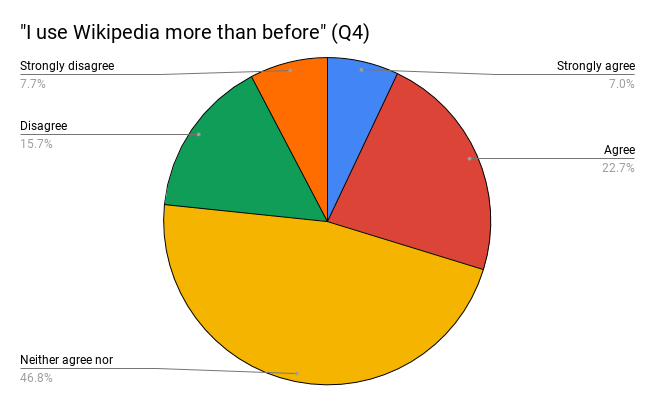 _IuseWikip...e_Q4.png
(Filesize: 23KB)
_IuseWikip...e_Q4.png
(Filesize: 23KB)
-
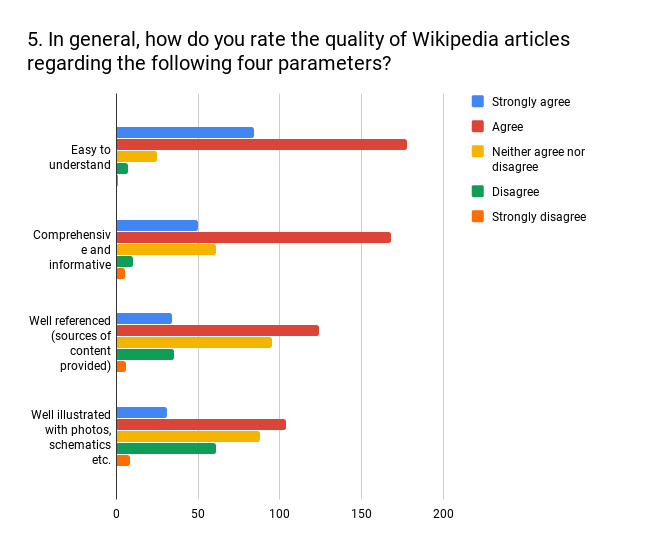 5.Ingenera...ers_.png
(Filesize: 23KB)
5.Ingenera...ers_.png
(Filesize: 23KB)
-
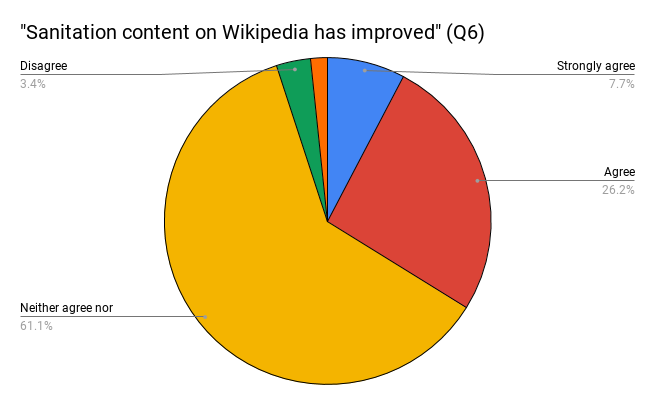 _Sanitatio...d_Q6.png
(Filesize: 23KB)
_Sanitatio...d_Q6.png
(Filesize: 23KB)
-
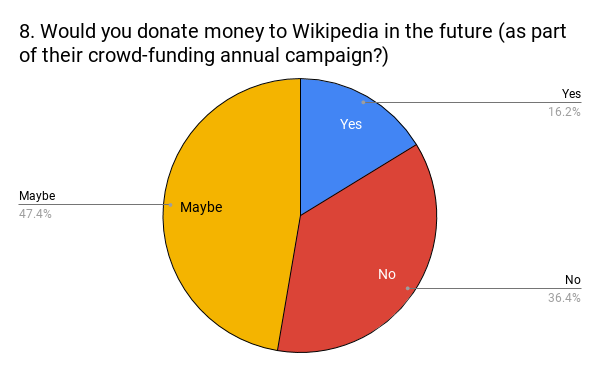 8.Wouldyou...ign_.png
(Filesize: 21KB)
8.Wouldyou...ign_.png
(Filesize: 21KB)
Please Log in to join the conversation.
You need to login to reply- Elisabeth
-
Topic Author
- User is blocked
- Freelance consultant since 2012
Less- Posts: 3372
- Karma: 54
- Likes received: 932
Re: Please take our short Sanitation Wikipedia survey - last opportunity until end of the week
I am going to post the results in three parts to make it more digestible:
Question 1: How often do you use Wikipedia?
Main result:
- 57% of people who responded use it weekly or even daily
Some additional responses included:
- Need based, it may be daily, weekly or monthly
- Depends on the topic. Sometimes weekly, sometimes less.
- When the need arises.
- it's my go-to when i need to
Question 2: What type of information do you look up on Wikipedia? (several answers possible)
Main results:
- Of the topic answers to choose from, WASH was the second-most picked topic area, followed by other work related content.
- The most common topic area was countries regions or towns
Further results:
- In the Other field, interesting or typical responses included "to translate it into other language - by changing language", random things, everything, general knowledge, definitions, "any term/place/concept I dont know", any kind of concepts, educational issues.
Question 3: If you rarely or never use Wikipedia, what are the main reasons?
Main results:
- 32 people said they don't use Wikipedia because "The information that I look for is usually not available on Wikipedia"
- 30 people said that they don't trust Wikipedia
- The other answer options provided attracted only few responses, indicating that issues with internet speed, language, images, clarity are not major deterrents
Other comments:
- Credibility was raised several times, such as " Not considered a credible reference for academic research", "I use wikipedia as a basic knowledge, not as a source of references for my paper.", "Sometimes not referenceable"
- Several people said they'd rather do a Google search (which may or may not lead them to Wikipedia as well), e.g. "If I google and wikipedia pops up then I use. Otherwise I use what I have googled". The trust in Google searches or the convenience that it provides is rather high, see also the answers for Question 10.
- to be continued -
Freelance consultant on environmental and climate projects
Attachments:
-
 Howoftendo...ia_1.png
(Filesize: 25KB)
Howoftendo...ia_1.png
(Filesize: 25KB)
-
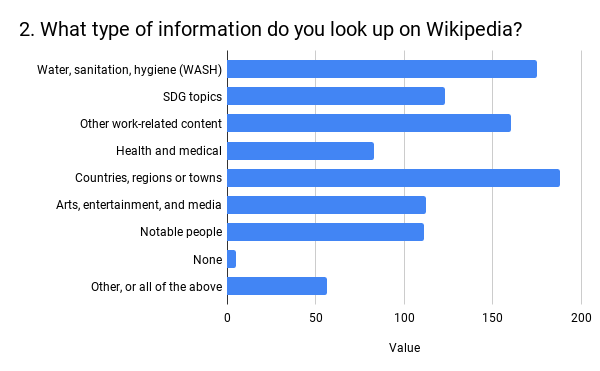 2.Whattype...dia_.png
(Filesize: 17KB)
2.Whattype...dia_.png
(Filesize: 17KB)
-
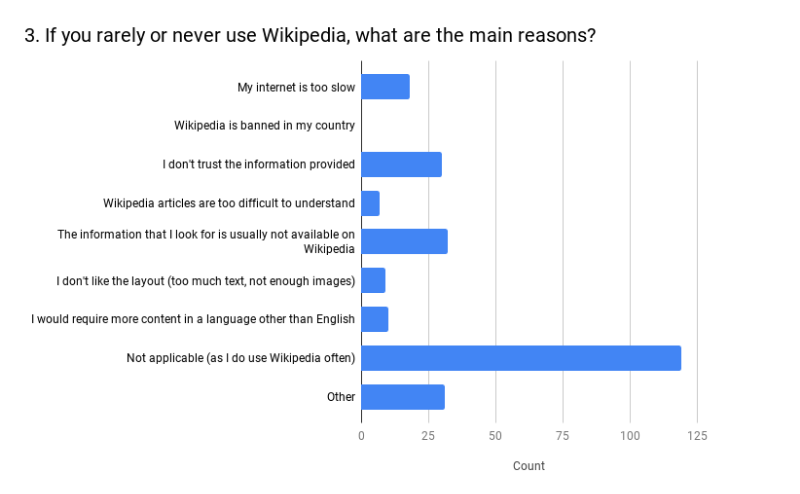 3.Ifyourar...ns_2.png
(Filesize: 60KB)
3.Ifyourar...ns_2.png
(Filesize: 60KB)
Please Log in to join the conversation.
You need to login to reply- Elisabeth
-
Topic Author
- User is blocked
- Freelance consultant since 2012
Less- Posts: 3372
- Karma: 54
- Likes received: 932
Re: Please take our short Sanitation Wikipedia survey - last opportunity until end of the week
Please participate in this survey to help shape the future direction of Wikipedia editing work for WASH!
Survey link:
docs.google.com/forms/d/e/1FAIpQLSdPTgI9...0vLvJVfHIeQ/viewform
Thanks.
Regards,
Elisabeth
P.S.
Here is what some of the respondents have said so far in response to the question:
9. What kind of improvements would you like to see done on sanitation-related content in Wikipedia?
(I'll later on group the responses by type of reply)
- More sourced information
- Making technical content accessible to non-technical audiences
- More illustrations be included
- I wouldn't consult wikipedia for any substantial information about anything, but only for general interest.
- 1. Consistency. Due to user generated content, some pages are good and some are weak. So consistent quality content on sanitation.
- 2. Links. Wikipedia is great for high level and general info, not so great for deeper insight. So links to more technical or detailed articles, resources, case studies etc would be great. Unfortunately there are so many different platforms for sanitation info and Google is so commercial and limited now, its hard to sometimes find the specific info one is looking for.
- 3. Timeliness: Wikipedia is best used like World Book--but that can make info outdated. This may be ok for general users, but keeping information current will make it more useful for WaSH professionals.
- 4. Authenticity: One challenge with Wikipedia is low confidence in authenticity and accuracy because the source of info is often unknown--unless one checks every reference which is impractical. So putting on each page the names / positions of those who have whetted and validated the information will inspire confidence.
- more ecological information and environmental factors
- Having more reliable information, confirmed by expert, and more linked to external literrature as well as some more explanatory pictures or even video.
- Comprehensive document based on good illustration
- Appropriate technologies for region/ hydro geological conditions based,
- To have more sanitation and sustainability related content updated and new articles
- Make it more known
Freelance consultant on environmental and climate projects
Please Log in to join the conversation.
You need to login to reply- Elisabeth
-
Topic Author
- User is blocked
- Freelance consultant since 2012
Less- Posts: 3372
- Karma: 54
- Likes received: 932
Re: Please take our short Sanitation Wikipedia survey!
We have 242 responses so far.
Perhaps I can get you curious and keen to contribute by sharing an interim result with you here:
--> A lot of SuSanA members use Wikipedia a lot: either daily or weekly.
Thanks for your time! Here is the link again: docs.google.com/forms/d/e/1FAIpQLSdPTgI9...0vLvJVfHIeQ/viewform
Elisabeth
Freelance consultant on environmental and climate projects
Attachments:
-
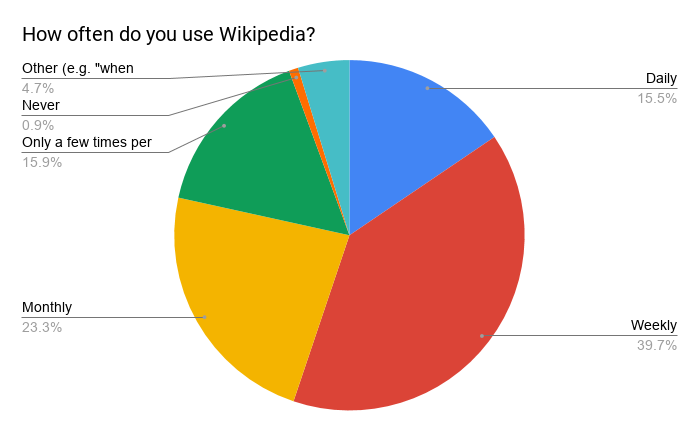 Howoftendo...dia_.png
(Filesize: 24KB)
Howoftendo...dia_.png
(Filesize: 24KB)
Please Log in to join the conversation.
You need to login to reply- Elisabeth
-
Topic Author
- User is blocked
- Freelance consultant since 2012
Less- Posts: 3372
- Karma: 54
- Likes received: 932
Re: Fw: [WG1] WG 1 members please take my Sanitation Wikipedia survey by 31 Oct
Thanks for taking our Sanitation Wikipedia survey (we are now at 230 responses - half way to our aim of 500 responses!).
I agree with you that sanitation is a very broad topic, or in fact that it is linked to many topics. That's why within the work of Wikipedia editing we have set up a "WikiProject Sanitation". For this project, we have added a tag to every Wikipedia article that is even remotely connected to sanitation. We have tagged about 550 articles so far. You can see here which ones are most popular (i.e. those receiving the highest number of views on a monthly basis):
en.wikipedia.org/wiki/Wikipedia:WikiProj...tation#By_popularity
Or direct link here: en.wikipedia.org/wiki/Wikipedia:WikiProj...tation/Popular_pages
See here a screenshot showing you the Top-20 (find more by clicking on the link above). You see a huge variety of topics but all related to sanitation, including the Wikipedia article on Bill Gates! As you can imagine this equals to lots of work to improve all those sanitation-related Wikipedia articles.
Regards,
Elisabeth
P.S. For anyone who hasn't taken the survey yet, here is the link: docs.google.com/forms/d/e/1FAIpQLSdPTgI9...0vLvJVfHIeQ/viewform
Please take it!
Freelance consultant on environmental and climate projects
Attachments:
-
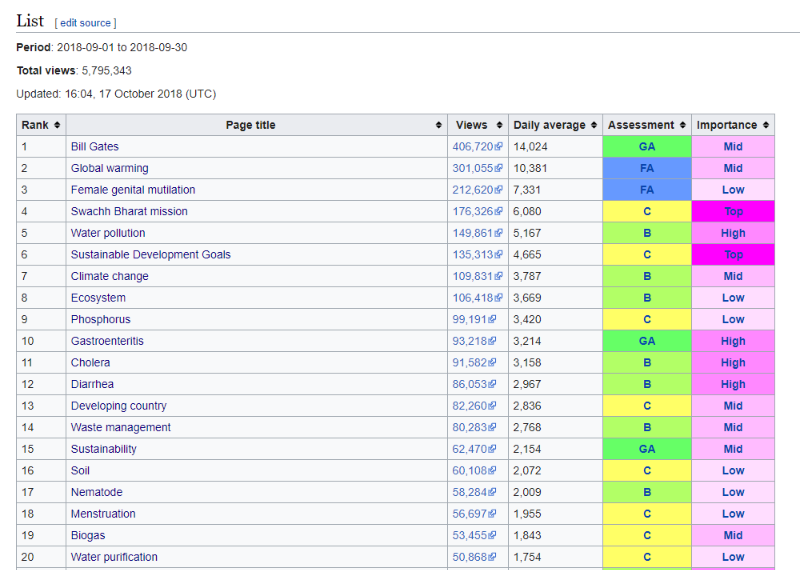 WikipediaW...dia1.png
(Filesize: 128KB)
WikipediaW...dia1.png
(Filesize: 128KB)
Please Log in to join the conversation.
You need to login to reply- samantabb
-

- My areas of specialization: Community Water Supply, Sanitation and Hygiene. My areas of interest: Situation analysis, Project Planning, Appraisal and Evaluation, School Sanitation and Hygiene Promotion
Less- Posts: 7
- Likes received: 2
Re: Fw: [WG1] WG 1 members please take my Sanitation Wikipedia survey by 31 Oct
While I have submitted my answers to your survey I would like to suggest the following. Sanitation is not just excreta snd sewage disposal but should also have Hygiene as an integral part. To me Sanitation is a way of life and may have package of 7 health related components.
1. Safe handing of drinking water from safe source
2. Disposal of waste water
3. Safe disposal of human excreta including child excreta
4. Safe disposal garbage and cattle dung
5. Home Sanitation and Food Hygiene
6. Personal hygiene including hand washing
7. Environmental Sanitation
We should have a holistic approach to sanitation as stated above. Hope this may be considered for the document you are trying bring out.
Please let me have your feed back.
WarM regds
BBSamanta, PhD
(The theme of my PhD related to technology transfer in rural water supply and sanitation in India with focus on the role of UNICEF, Berhampur University, India (1997))
Consultant, formerly UNICEF
Odisha, India
Post-graduate Diploma in Community Water Supply, Sanitation and Hygiene from Loughborough University of Technology, UK (1993)
Post-graduate Diploma in National Economic Planning (Regional Planning Specialization) from Central School of Planning & Statistics, Warsaw, Poland (1973)
Master of Commerce (Economics specialization) from Allahabad University, India (1963)
Please Log in to join the conversation.
You need to login to reply- Elisabeth
-
Topic Author
- User is blocked
- Freelance consultant since 2012
Less- Posts: 3372
- Karma: 54
- Likes received: 932
Re: Please take my short Sanitation Wikipedia survey!
Here is the link again: docs.google.com/forms/d/e/1FAIpQLSdPTgI9...0vLvJVfHIeQ/viewform
I'd love to get over 500 responses which would be about 5% of all SuSanA members.
It only takes a few minutes and anyone can take the survey - whether you have ever used Wikipedia or not!
Thanks in advance,
Elisabeth
Freelance consultant on environmental and climate projects
Please Log in to join the conversation.
You need to login to reply- Forum
- categories
- Attitudes and behaviours
- Wikipedia
- Our Sanitation Wikipedia survey - results and discussion








